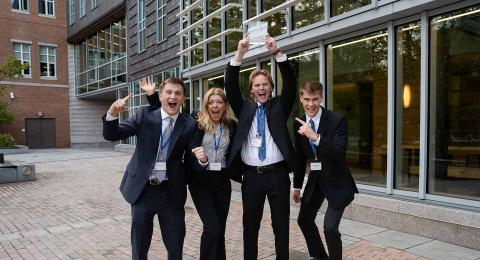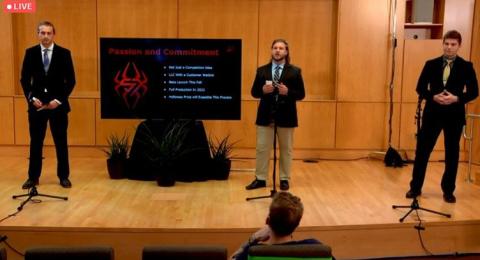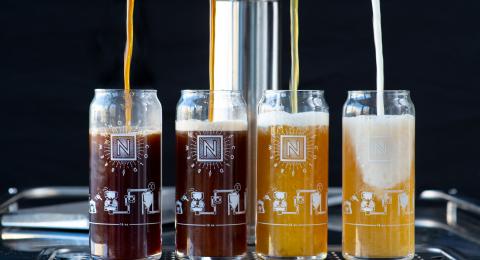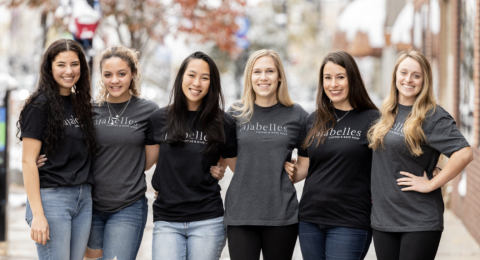Holloway is a multi-track business competition that challenges students to develop viable products or services and present plans to bring them to market. Get out of the classroom and into the real world.
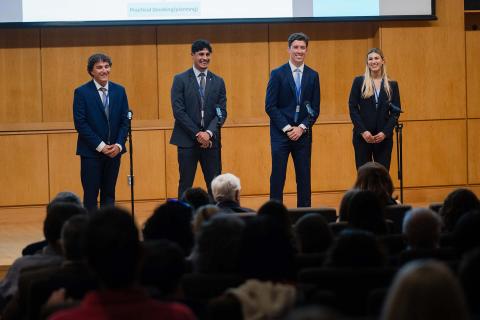
Over the past 37 years the Holloway Competition has awarded over $1.2 million to USNH students to pursue their business ideas. In the championship round, six teams compete for nearly $35,000 in cash awards.
The 20 teams that advance to the Semifinal Bud Albin Challenge Round also receive cash prizes of at least $300 per team, usually totaling over $5,000.
$15,000 - 1st Place Team
$10,000 - 2nd Place Team
$5,000 - 3rd Place Team
$1,000 - Runner-Up Teams
Do you have an idea for a new business or innovative solution to a pressing problem? The Holloway Competition is your chance to turn dreams into reality. Entries should be innovative, feasible to implement and address an identified market need. To get started, simply:
Pick a track
The distinguishing feature of your venture will determine your track within the competition. First place winners in each track within the Semifinal Bud Albin Challenge Round will continue to the Championship Round. During registration you can select your preferred track, however the Holloway Competition Chair reserves the right to change track assignments.

Health and Wellness Ventures

Sustainability, Energy, and Infrastructure Ventures

Software and Information Technology Ventures

Other High-Potential Ventures
Build your team
Holloway Competition teams may have a maximum of four active members. Participation is open to all currently enrolled undergraduate and graduate students from any discipline within the University System of New Hampshire: UNH Durham, Manchester, and Law School; KSU, PSU, UNH CPS Online. Teams may have members outside of the USNH system, but they are not allowed to directly participate in the Competition.
Every team is required to have an advisor by the second round of the competition. If your team does not yet have an advisor when submitting your initial entry, please put “TBD” in the advisor information fields in your application. Any USNH faculty or staff member can serve as your advisor for the Holloway competition. We encourage you to seek an advisor that has expertise related to your entry and that you (ideally) already know from classes, project work, co-curricular activities etc.
If applicable, participants may have two faculty advisors: one serving as a subject–matter expert and the other as a business expert. Non-business majors are encouraged to contact a business faculty advisor as well as a faculty advisor in their specific discipline.
The UNH E-Center is the co-curricular heart of ideas, innovation, and entrepreneurship at the University of New Hampshire and is open to all students from any college or major. They offer 1:1 coaching and mentoring - everything from a quick question to on-going weekly sessions are available at no cost to you.
ECenter executive director Joshua Cyr has been the faculty advisor for many winning Holloway teams. Request a meeting for a one-on-one coaching session.
The ECenter also hosts Entrepreneurs in Residence (EIR) every Tuesday and Thursday from 12:30-2PM for drop-in visits from students working on ideas. The EIRs are tested entrepreneurs who are passionate about innovation and entrepreneurship and are excited to work with students on their entrepreneurship journey, whether for a competition or their dream idea!
- Hachemi Aliouche, Ph.D.
- Audrey Ashton-Savage, M.B.A.
- Shane R. Baker
- Ludwig Bstieler, Ph.D.
- Jianhong Chen, Ph.D.
- Michael R. Collins, Ph.D.
- Diane Devine, M.B.A.
- Devkamal Dutta, Ph.D.
- Diane L. Foster, Ph.D.
- Robert A. Gough Jr., Ph.D.
- Ian Grant
- Roger Grinde, Ph.D.
- Todd C. Guerdat, Ph.D.
- Kholekile L. Gwebu, Ph.D.
- William Hassey, Ed.D.
- Daniel E. Innis, Ph.D.
- Valentini Kalargyrou, Ph.D.
- Jun Li, Ph.D.
- Carl Lindblade
- Jerry E. Marceau
- Michael Merenda, Ph.D.
- Lee Mizusawa
- Ivaylo Petrov Nedyalkov, Ph.D.
- Neil Niman, Ph.D.
- Bruce E. Pfeiffer, Ph.D.
- Jeffrey E. Sohl, Ph.D.
- May-Win Thein, Ph.D.
- Elizabeth Varki, Ph.D
- Fiona Wilson, Ph.D.
- Daniel R. Winans, M.S.
- Goksel Yalcinkaya, Ph.D.
-
Lisa Keslar, M.B.A
-
Wheeler Ruml, Ph.D.
-
Rich Messner, Ph.D.
-
Joshua Cyr
-
Alex LaBrecque, Ph.D.
-
Stephen Ciccone, Ph.D.
-
Rick Kilbride, M.B.A
-
Timm Triplett, Ph.D.
-
James Kibler, M.B.A
-
Michael Kukenberger, Ph.D.
* Advising Holloway participants is strictly voluntary for faculty members and faculty members are free to advise as many or as few participants as they choose.
1. Participants must provide honest and accurate information in registration, written materials, pitches, and all other aspects of the Competition.
2. Participants must treat staff, faculty, volunteers, judges, fellow competitors and all others involved with the Competition with respect and professionalism.
3. Participants commit to participating in all rounds of the Competition to which they have been invited.
4. The judges’ decisions are final.
5. Participants understand that the Competition is a public event and have adjusted their intellectual property approach accordingly.
6. In-kind prizes will be awarded to finalists based on the discretion of the sponsor and/or the Competition Chair. Cash prizes are awarded according to the schedule on the Competition website.
7. The Competition Chair can remove any team that violates these rules.
8. Prize money will be divided equally amongst all registered team members and paid directly to individual team members according to USNH rules for such payments.
How the competition works
The Holloway Prize Competition has four rounds – initial registration, selecting 20 semi-finalist teams, selecting six final teams during the Semifinal Bud Albin Challenge, and the Championship. Each round is designed to help the remaining teams grow and polish their business plans.
| 2025 | Date | Time | Description |
|---|---|---|---|
|
February 5 |
12:40 - 2:00 p.m. |
In person, drop-in info session in Paul College Room G45 |
|
| February 6 | 3:30-5:00p.m. | Virtual, via Teams | |
|
|
February 7 |
Registration Opens |
|
|
DEADLINE |
February 21 |
by 11:59 p.m. |
Deadline to submit 1st round entry by 11:59 p.m. |
|
|
February 26 |
|
Notification of advancement to 2nd round. |
|
DEADLINE |
March 14 |
by 11:59 p.m. |
Deadline to submit 2nd round entry (by invite). |
|
|
March 21 |
|
Notification of advancement to Albin Challenge (semi-final) round. |
|
DEADLINE |
April 4 |
by 11:59 p.m. |
Deadline to submit semi-final entry (by invite). |
|
|
April 11 |
1 p.m. |
Bud Albin Challenge Semi-Final and Runoff Rounds |
|
DEADLINE |
April 25 |
by 11:59 p.m. |
Deadline to submit revised proposal (by invite). |
|
|
May 6 |
1 p.m. |
Paul J. Holloway Prize Championship Round |
|
|
|
|
|
ROUND ONE: Submit your Pitch
This year we are excited to be using the StartupTree platform for managing Holloway Competition entries. StartupTree is more intuitive and user-friendly that the system we’ve used in the past and we’re confident it will provide a better user experience for both competitors and judges. The Holloway StartupTree platform will be available starting February 7th and we encourage teams to familiarize themselves with it before beginning their submission.
Participants must prepare two components as part of their registration for round one of Holloway: answers to 10 questions (limited to 1000 characters each) and an informative video (limited to 90 seconds). We strongly recommend writing answers in a word processer and then the pasting these into StartupTree.
These materials will be used to judge the first round – judges will evaluate each of your answers on a 3-point scale (pass, lowpass, fail) to provide guidance on where to improve if your team is invited to submit a second round entry.
As you start the competition, we fully understand that many of our questions will be challenging. Please do your best to present thoughtful and professional answers. In general, strong answers are:
Specific – Offer a direct answer to the question
Well-Reasoned – Make clear why you arrived at this answer over others
Empirically Supported – Replace assumptions and anecdotes with research
Mutually Exclusive and Collectively Exhaustive – Eliminate redundancy while not leaving gaps
If you feel stuck, don’t be shy about accessing the support resources UNH has available.
Answer the following questions to the best of your ability. Answers are limited to 1000 characters per question. The questions will also appear in StartupTree:
1) Entrepreneurship is commonly thought of as an exercise in problem solving, so to start things off, tell us about the problem you are interested in solving.
2) Next, tell us about your solution. At this point, your solution can simply be an idea or vision for a product or service, it does NOT need to be a prototype, working app, etc. [Examples: Uber offered a new solution to the problem of taxis being hard to find]
3) Describe how your solution is better than current solutions? Think about how your solution is more valuable from the perspective of potential customers than current solutions (this will form the core of your “customer value proposition”). [Hint: Common value propositions include being easier to use, less expensive, more reliable, safer, more accurate etc.]
4) Next, tell us about how your solution works and how you plan to protect it? Is it built on an underlying technology? Is it a different approach to offering a service? Is it a new kind of process? etc. Is there any intellectual propriety (Patents, Copyrights, Trademarks) associated with your solution? If not, how do you plan to protect it from competitors?
5) One option for entering the Holloway Competition is to present someone else’s idea. If you are presenting your own idea, please go to Question 6. If you are presenting someone else’s idea, please specify the owners and provide written permission to the Chair to present this idea at the Holloway Competition.
6) Now, tell us about the market for your solution. Who will be your first customers (i.e. early adopters) and how many are there? How about other groups of customers? Add these together to estimate the overall market size for your solution and share how this overall market changing (i.e. is it growing, etc.)
7) Describe your revenue model and pricing models. How did you decide on these? Offer as much detail and support as possible. [Hint: A revenue model shows how you will be paid for providing your solution. Common revenue models include subscription (e.g. Netflix), ad-supported (e.g. Google), “Freemium” (e.g. LinkedIn), and direct-sales (e.g. Tesla)]
8) Describe your sales and distribution plans. How will you reach your customers to let them know about your solution? If they decide to purchase your solution, how will you deliver it to them?
9) Tell us about your team. Cover your backgrounds, skills, connections to this problem/solution etc. Do you have any business, technical, or industry experts that have agreed to advise you in developing your venture?
10) Help us understand how you arrived at your answers to questions 1-9. Did you conduct interviews with customers, industry experts, key partners etc.? Did you administer any surveys? Did you analyze reputable secondary data sources? Please offer as much detail as possible.
Success in the entrepreneurship depends, in part, on how effectively you communicate your elements of venture. Strong presentation skills make your “pitch” more effective and can gain support from key stakeholders. You job is to tell a story of your venture that connects emotionally, as well as rationally, and present it with energy and conviction.
First round video submissions must adhere to a strict maximum length of 90 seconds and be hosted on a video sharing platform such as YouTube, Vimeo, etc.
Your stand-alone, original video pitch should highlight the following:
-
The problem that your product or service is intended to address.
-
Your proposed solution – that is, how your product or service addresses the market need.
-
How it will attract customer and sales (your value proposition) and investors’ interests.
You're selected! Now what?
After registration, future rounds of the Holloway Competion are by invitation. If you are selected to proceed to the second round (and beyond), here's what you need to know:
Teams advancing to this round are required to expand or modify their answers to our initial questions (1 through 9) with more detail, as well as additional questions 10 through 16 in StartupTree.
They will also expand their business proposal to include an executive summary and simple pro forma cash-flow and income statements. At this time, teams may also revise and resubmit their max 90-second video describing the problem and solution.
Your round 2 written submission should have:
- One-page executive summary.
- Answer all questions (teams are encouraged to update answers to questions 1 – 9 in addition to providing answers to questions 10 – 16).
- The three required financial statements and other information you may want to submit. This could include marketing materials, product schematics, timeline or survey data, or any materials you wish to reference in your answers to the questions.
Twenty teams will advance from this round to the Semi-final Bud Albin Challenge Round.
Questions 10 - 16 will help you describe the assumptions, highlights, support, reasoning, etc. of your financial model. Please always include the question number with your response and use appendices for required financial statements.
10. One of the early challenges entrepreneurs always face is transitioning from idea to “first sale.” Describe in detail your “go-to-market” plan to address this challenge and the costs your venture will incur prior to earning significant revenue.
11. After entering the market, entrepreneurs need to grow their ventures to become financially sustainable. Describe in detail your plan for “scaling” your ventures. As part of this plan show, how your cost of goods sold, gross margins, geographic footprint and other key metrics change as your venture grows.
12. Sales forecasting is difficult even for established companies in relatively stable markets, but it is even more challenging for new ventures. Despite this, the potential size and growth rate of your business is a critical thing to estimate. Provide a credible estimate of the potential scale of your venture.
13. To generate a more holistic financial picture of your venture describe in detail the fixed expenses your ventures will incur as it launches and grows.
14. Entrepreneurs usually need to marshal resources beyond what they personally control and financial resources often pose a particularly challenging hurdle for new entrepreneurs. Please describe how you will assemble the financial resources needed to launch, scale, and operate your venture and what you will offer resource providers in return.
15. Launching, scaling, and operating a new venture never goes according to plan. Please list the top 3-5 risks your venture faces and how you plan to mitigate these risks.
16. Help us understand how you arrived at your answers to questions 1-15. Did you conduct interviews with customers, industry experts, key partners etc.? Did you administer any surveys? Did you analyze reputable secondary data sources? Please offer as much detail as possible.
In the appendices, please include a minimum of:
- Monthly cash flow for Year 1
- Annual Cash flow for Years 2-5
- Income Statement Years 1-5
Twenty teams will advance to the Semifinal Bud Albin Challenge Round to present their case before a panel of industry judges who have reviewed their written submissions and videos.
Students are allotted ten minutes to present (inluding their video) followed by 15 minutes of Q&A with the judges.
New assets should include a PowerPoint, a poster, and, if possible, a prototype of their innovation. Posters are not required to be part of the formal presentation.
At the conclusion of the Bud Albin Challenge Round, all teams will receive detailed feedback from the judges. Four teams will be announced as the winners in their track and move on to the Championship Round. The second place winners in each track will then compete in a run-off round and present again to a separate panel of judges. The top two teams in the runoff will move on to the Championship.
Ultimately, six teams will advance to the Championship Round.
At this time, over $5,000 in cash prizes will be awarded to all teams not advancing to the Championship Round. All first-place teams in each of the four tracks are guaranteed a spot in the finals. Two second-place teams will also advance.
$600 - 2nd Place Teams
$500 - 3rd Place Teams
$300 - Runner-up Teams
Six teams will advance to the final round of the competition.
Each team will show their 90 second video, followed by 8.5 minutes to present their case before a panel of industry judges, and ending with 15 minutes of Q&A with the same judges.
What makes the Holloway Prize Championship Round very different from previous rounds is the public nature of the presentations. The Championship Round is open to the public, with an audience comprised of business people; venture capitalists; UNH faculty, staff, administrators, and students; as well as family and friends of contestants. Presentations will also be recorded for public distribution.
Feedback from your advisor and the Semifinal Bud Albin Challenge Round judges should be used to further refine your presentation for this round. Presentation order will be randomly selected. All team members must be present during all presentations, and business professional dress is required. Teams may use props during their presentation.
Questions? Email holloway.prize@unh.edu
